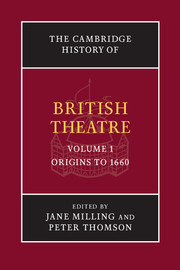Book contents
- Frontmatter
- PART I PRE-ELIZABETHAN THEATRE
- PART II ELIZABETHAN THEATRE
- PART III JACOBEAN AND CAROLINE THEATRE
- 13 Working playwrights, 1580–1642
- 14 Theatre and controversy, 1603–1642
- 15 The Stuart masque and its makers
- 16 Clowns, fools and knaves: stages in the evolution of acting
- 17 Thomas Middleton's A Game at Chess: a case study
- 18 The condition of the theatres in 1642
- 19 Theatre and Commonwealth
- Works Cited
- Index
- References
17 - Thomas Middleton's A Game at Chess : a case study
from PART III - JACOBEAN AND CAROLINE THEATRE
Published online by Cambridge University Press: 28 March 2008
- Frontmatter
- PART I PRE-ELIZABETHAN THEATRE
- PART II ELIZABETHAN THEATRE
- PART III JACOBEAN AND CAROLINE THEATRE
- 13 Working playwrights, 1580–1642
- 14 Theatre and controversy, 1603–1642
- 15 The Stuart masque and its makers
- 16 Clowns, fools and knaves: stages in the evolution of acting
- 17 Thomas Middleton's A Game at Chess: a case study
- 18 The condition of the theatres in 1642
- 19 Theatre and Commonwealth
- Works Cited
- Index
- References
Summary
Thomas Middleton's A Game at Chess was a phenomenon, being – by several criteria – the most successful play of the Tudor/Stuart era. It ran for nine consecutive days at the Globe, from 5–14 August 1624 (interrupted only by the standard prohibition against playing on Sunday 8 August), at a time when repertoires normally changed almost daily to provide fresh fare for playgoers. Even so, it played to packed houses. The indefatigable letter-writer John Chamberlain reported that it ‘has been followed with extraordinary concourse, and frequented by all sorts of people old and young, rich and poor, masters and servants, papists and puritans, wise men et[c], churchmen and statesmen … and a world besides’. John Holles also found daunting crowds when he rowed to the Globe: ‘which house I found so thronged, that by scores they came away for want of place, though as yet little past one; nevertheless loath to check the appetite, which came so seldom to me (not having been in a playhouse these ten years) & such a dainty not every day to be found, I marched on, & heard the pasquin’ ( Chess , 198). The Spanish ambassador, Don Carlos Coloma, reported ‘that there were more than 3000 persons there on the day that the audience was smallest’ ( Chess , 194), and it would have run even longer if he had not complained about it to King James, who then ordered the King's Men to cease playing altogether while the affair was investigated.
- Type
- Chapter
- Information
- The Cambridge History of British Theatre , pp. 424 - 438Publisher: Cambridge University PressPrint publication year: 2004
References
- 1
- Cited by

